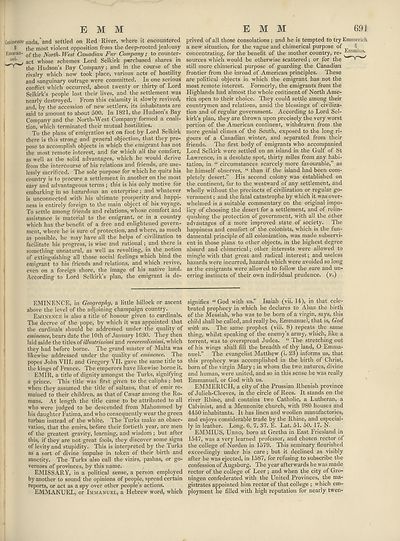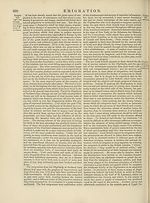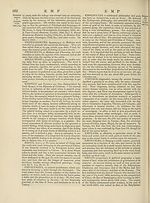Encyclopaedia Britannica > Volume 8, DIA-England
(701) Page 691
Download files
Complete book:
Individual page:
Thumbnail gallery: Grid view | List view

EMM
Eminence nada,’and settled on Red River, where it encountered
II the most violent opposition from the deep-rooted jealousy
ftmnian- 0pt|ie North-West Canadian Fur Company; to counter-
act whose schemes Lord Selkirk parchased shares in
Hudson’s Bay Company; and in the course of the
rivalry which now took place, various acts of hostility
and sanguinary outrage were committed. In one serious
conflict which occurred, about twenty or thirty of Lord
Selkirk’s people lost their lives, and the settlement was
nearly destroyed. From this calamity it slowly revived,
and, by the accession of new settlers, its inhabitants are
said to amount to about 500. In 1821, the Hudson’s Bay
Company and the North-West Company formed a coali¬
tion, which terminated their mutual hostilities.
To the plans of emigration set on foot by Lord Selkirk
there is this strong and general objection, that they pro¬
pose to accomplish objects in which the emigrant has not
the most remote interest, and for which all the comfort,
as well as the solid advantages, which he would derive
from the intercourse of his relations and friends, are use¬
lessly sacrificed. The sole purpose for which he quits his
country is to procure a settlement in another on the most
easy and advantageous terms; this is his only motive for
embarking in so hazardous an enterprise ; and whatever
is unconnected with his ultimate prosperity and happi¬
ness is entirely foreign to the main object of his voyage.
To settle among friends and relations, whose comfort and
assistance is material to the emigrant, or in a country
which has the benefit of a free and enlightened govern¬
ment, where he is sure of protection, and where, as much
as possible, he may have all the helps of civilization to
facilitate his progress, is wise and rational; and there is
something unnatural, as well as revolting, in the notion
of extinguishing all those social feelings which bind the
emigrant to his friends and relations, and which revive,
even on a foreign shore, the image of his native land.
According to Lord Selkirk’s plan, the emigrant is de-
EMINENCE, in Geography, a little hillock or ascent
above the level of the adjoining champaign country.
Eminence is also a title of honour given to cardinals.
The decree of the pope, by which it was appointed that
the cardinals should be addressed under the quality of
eminence, bears date the 10th of January 1630. They then
laid aside the titles of illustrissimi and reverendissimi, which
they had before borne. The grand master of Malta was
likewise addressed under the quality of eminence. rlhe
popes John VIII. and Gregory VII. gave the same title to
the kings of France. The emperors have likewise borne it.
EMIR, a title of dignity amongst the Turks, signifying
a prince. This title was first given to the caliphs ; but
when they assumed the title of sultans, that of emir re¬
mained to their children, as that of Caesar among the Ro¬
mans. At length the title came to be attributed to all
who were judged to be descended from Mahommed by
his daughter Fatima, and who consequently wear the green
turban instead of the white. The Turks make an obser¬
vation, that the emirs, before their fortieth year, are men
of the greatest gravity, learning, and wisdom ; but after
this, if they are not great fools, they discover some signs
of levity and stupidity. This is interpreted by the Turks
as a sort of divine impulse in token of their birth and
sanctity. The Turks also call the vizirs, pashas, or go¬
vernors of provinces, by this name.
EMISSARY, in a political sense, a person employed
by another to sound the opinions of people, spread certain
reports, or act as a spy over other people’s actions.
EMMANUEL, or Immanuel, a Hebrew word, which
EMM 691
prived of all those consolations; and he is tempted to try Emmerich
a new situation, for the vague and chimerical purpose of II.
concentrating, for the benefit of the mother country, re-
sources which would be otherwise scattered; or for the
still more chimerical purpose of guarding the Canadian
frontier from the inroad of American principles. These
are political objects in which the emigrant has not the
most remote interest. Formerly, the emigrants from the
Highlands had almost the whole continent of North Ame¬
rica open to their choice. They could settle among their
countrymen and relations, amid the blessings of civiliza¬
tion and of regular government. According to Lord Sel¬
kirk’s plan, they are thrown upon precisely the very worst
portion of the American continent, withdrawn from the
more genial climes of the South, exposed to the long ri¬
gours of a Canadian winter, and separated from their
friends. The first body of emigrants who accompanied
Lord Selkirk were settled on an island in the Gulf of St
Lawrence, in a desolate spot, thirty miles from any habi¬
tation, in “ circumstances scarcely more favourable,” as
he himself observes, “ than if the island had been com¬
pletely desert.” His second colony was established on
the continent, far to the westward of any settlement, and
wholly without the precincts of civilization or regular go¬
vernment ; and the fatal catastrophe by which it was over¬
whelmed is a suitable commentary on the original impo¬
licy of choosing the desert for a settlement, and of relin¬
quishing the protection of government, with all the other
advantages of a more improved state of society. The
happiness and comfort of the colonists, which is the fun¬
damental principle of all colonization, was made subservi¬
ent in those plans to other objects, in the highest degree
absurd and chimerical; other interests were allowed to
mingle with that great and radical interest; and useless
hazards were incurred, hazards which were avoided so long
as the emigrants were allowed to follow the sure and un¬
erring instincts of their own individual prudence, (e.)
signifies “ God with us.” Isaiah (vii. 14), in that cele¬
brated prophecy in which he declares to Ahaz the birth
of the Messiah, who was to be born of a virgin, says, this
child shall be called, and really be, Emmanuel, that is, God
with us. The same prophet (viii. 8) repeats the same
thing, whilst speaking of the enemy’s army, which, like a
torrent, was to overspread Judea. “ The stretching out
of his wings shall fill the breadth of thy land, O Emma¬
nuel.” The evangelist Matthew (i. 23) informs us, that
this prophecy was accomplished in the birth of Christ,
born of the virgin Mary ; in whom the two natures, divine
and human, were united, and so in this sense he was really
Emmanuel, or God with us.
EMMERICH, a city of the Prussian Rhenish province
of Julieh-Cleeves, in the circle of Rees. It stands on the
river Rhine, and contains two Catholic, a Lutheran, a
Calvinist, and a Mennonite church, with 980 houses and
4450 inhabitants. It has linen and woollen manufactories,
and enjoys considerable trade by the Rhine, and especial¬
ly in leather. Long. 6. 7. 37. E. Lat. 51. 50. 17. N.
EMMIUS, Ubbo, born at Gretha in East Friesland in
1547, was a very learned professor, and chosen rector ol
the college of Norden in 1579. This seminary flourished
exceedingly under his care; but it declined as visibly
after he was ejected, in 1587, for refusing to subscribe the
confession of Augsburg. The year afterwards he was made
rector of the college of Leer; and when the city of Gro¬
ningen confederated with the United Provinces, the ma¬
gistrates appointed him rector of that college ; which em¬
ployment he filled with high reputation for nearly twen-
Eminence nada,’and settled on Red River, where it encountered
II the most violent opposition from the deep-rooted jealousy
ftmnian- 0pt|ie North-West Canadian Fur Company; to counter-
act whose schemes Lord Selkirk parchased shares in
Hudson’s Bay Company; and in the course of the
rivalry which now took place, various acts of hostility
and sanguinary outrage were committed. In one serious
conflict which occurred, about twenty or thirty of Lord
Selkirk’s people lost their lives, and the settlement was
nearly destroyed. From this calamity it slowly revived,
and, by the accession of new settlers, its inhabitants are
said to amount to about 500. In 1821, the Hudson’s Bay
Company and the North-West Company formed a coali¬
tion, which terminated their mutual hostilities.
To the plans of emigration set on foot by Lord Selkirk
there is this strong and general objection, that they pro¬
pose to accomplish objects in which the emigrant has not
the most remote interest, and for which all the comfort,
as well as the solid advantages, which he would derive
from the intercourse of his relations and friends, are use¬
lessly sacrificed. The sole purpose for which he quits his
country is to procure a settlement in another on the most
easy and advantageous terms; this is his only motive for
embarking in so hazardous an enterprise ; and whatever
is unconnected with his ultimate prosperity and happi¬
ness is entirely foreign to the main object of his voyage.
To settle among friends and relations, whose comfort and
assistance is material to the emigrant, or in a country
which has the benefit of a free and enlightened govern¬
ment, where he is sure of protection, and where, as much
as possible, he may have all the helps of civilization to
facilitate his progress, is wise and rational; and there is
something unnatural, as well as revolting, in the notion
of extinguishing all those social feelings which bind the
emigrant to his friends and relations, and which revive,
even on a foreign shore, the image of his native land.
According to Lord Selkirk’s plan, the emigrant is de-
EMINENCE, in Geography, a little hillock or ascent
above the level of the adjoining champaign country.
Eminence is also a title of honour given to cardinals.
The decree of the pope, by which it was appointed that
the cardinals should be addressed under the quality of
eminence, bears date the 10th of January 1630. They then
laid aside the titles of illustrissimi and reverendissimi, which
they had before borne. The grand master of Malta was
likewise addressed under the quality of eminence. rlhe
popes John VIII. and Gregory VII. gave the same title to
the kings of France. The emperors have likewise borne it.
EMIR, a title of dignity amongst the Turks, signifying
a prince. This title was first given to the caliphs ; but
when they assumed the title of sultans, that of emir re¬
mained to their children, as that of Caesar among the Ro¬
mans. At length the title came to be attributed to all
who were judged to be descended from Mahommed by
his daughter Fatima, and who consequently wear the green
turban instead of the white. The Turks make an obser¬
vation, that the emirs, before their fortieth year, are men
of the greatest gravity, learning, and wisdom ; but after
this, if they are not great fools, they discover some signs
of levity and stupidity. This is interpreted by the Turks
as a sort of divine impulse in token of their birth and
sanctity. The Turks also call the vizirs, pashas, or go¬
vernors of provinces, by this name.
EMISSARY, in a political sense, a person employed
by another to sound the opinions of people, spread certain
reports, or act as a spy over other people’s actions.
EMMANUEL, or Immanuel, a Hebrew word, which
EMM 691
prived of all those consolations; and he is tempted to try Emmerich
a new situation, for the vague and chimerical purpose of II.
concentrating, for the benefit of the mother country, re-
sources which would be otherwise scattered; or for the
still more chimerical purpose of guarding the Canadian
frontier from the inroad of American principles. These
are political objects in which the emigrant has not the
most remote interest. Formerly, the emigrants from the
Highlands had almost the whole continent of North Ame¬
rica open to their choice. They could settle among their
countrymen and relations, amid the blessings of civiliza¬
tion and of regular government. According to Lord Sel¬
kirk’s plan, they are thrown upon precisely the very worst
portion of the American continent, withdrawn from the
more genial climes of the South, exposed to the long ri¬
gours of a Canadian winter, and separated from their
friends. The first body of emigrants who accompanied
Lord Selkirk were settled on an island in the Gulf of St
Lawrence, in a desolate spot, thirty miles from any habi¬
tation, in “ circumstances scarcely more favourable,” as
he himself observes, “ than if the island had been com¬
pletely desert.” His second colony was established on
the continent, far to the westward of any settlement, and
wholly without the precincts of civilization or regular go¬
vernment ; and the fatal catastrophe by which it was over¬
whelmed is a suitable commentary on the original impo¬
licy of choosing the desert for a settlement, and of relin¬
quishing the protection of government, with all the other
advantages of a more improved state of society. The
happiness and comfort of the colonists, which is the fun¬
damental principle of all colonization, was made subservi¬
ent in those plans to other objects, in the highest degree
absurd and chimerical; other interests were allowed to
mingle with that great and radical interest; and useless
hazards were incurred, hazards which were avoided so long
as the emigrants were allowed to follow the sure and un¬
erring instincts of their own individual prudence, (e.)
signifies “ God with us.” Isaiah (vii. 14), in that cele¬
brated prophecy in which he declares to Ahaz the birth
of the Messiah, who was to be born of a virgin, says, this
child shall be called, and really be, Emmanuel, that is, God
with us. The same prophet (viii. 8) repeats the same
thing, whilst speaking of the enemy’s army, which, like a
torrent, was to overspread Judea. “ The stretching out
of his wings shall fill the breadth of thy land, O Emma¬
nuel.” The evangelist Matthew (i. 23) informs us, that
this prophecy was accomplished in the birth of Christ,
born of the virgin Mary ; in whom the two natures, divine
and human, were united, and so in this sense he was really
Emmanuel, or God with us.
EMMERICH, a city of the Prussian Rhenish province
of Julieh-Cleeves, in the circle of Rees. It stands on the
river Rhine, and contains two Catholic, a Lutheran, a
Calvinist, and a Mennonite church, with 980 houses and
4450 inhabitants. It has linen and woollen manufactories,
and enjoys considerable trade by the Rhine, and especial¬
ly in leather. Long. 6. 7. 37. E. Lat. 51. 50. 17. N.
EMMIUS, Ubbo, born at Gretha in East Friesland in
1547, was a very learned professor, and chosen rector ol
the college of Norden in 1579. This seminary flourished
exceedingly under his care; but it declined as visibly
after he was ejected, in 1587, for refusing to subscribe the
confession of Augsburg. The year afterwards he was made
rector of the college of Leer; and when the city of Gro¬
ningen confederated with the United Provinces, the ma¬
gistrates appointed him rector of that college ; which em¬
ployment he filled with high reputation for nearly twen-
Set display mode to:
![]() Universal Viewer |
Universal Viewer | ![]() Mirador |
Large image | Transcription
Mirador |
Large image | Transcription
Images and transcriptions on this page, including medium image downloads, may be used under the Creative Commons Attribution 4.0 International Licence unless otherwise stated. ![]()
| Encyclopaedia Britannica > Encyclopaedia Britannica > Volume 8, DIA-England > (701) Page 691 |
|---|
| Permanent URL | https://digital.nls.uk/193332118 |
|---|
| Attribution and copyright: |
|
|---|
| Description | Ten editions of 'Encyclopaedia Britannica', issued from 1768-1903, in 231 volumes. Originally issued in 100 weekly parts (3 volumes) between 1768 and 1771 by publishers: Colin Macfarquhar and Andrew Bell (Edinburgh); editor: William Smellie: engraver: Andrew Bell. Expanded editions in the 19th century featured more volumes and contributions from leading experts in their fields. Managed and published in Edinburgh up to the 9th edition (25 volumes, from 1875-1889); the 10th edition (1902-1903) re-issued the 9th edition, with 11 supplementary volumes. |
|---|---|
| Additional NLS resources: |
|

